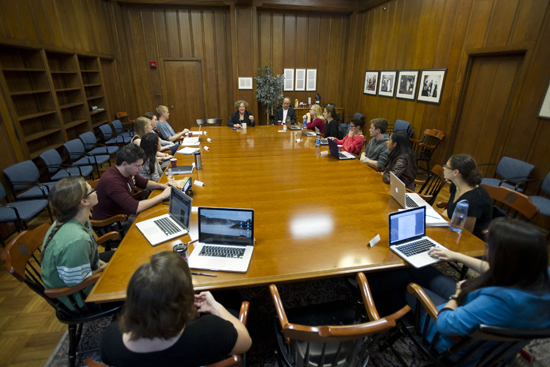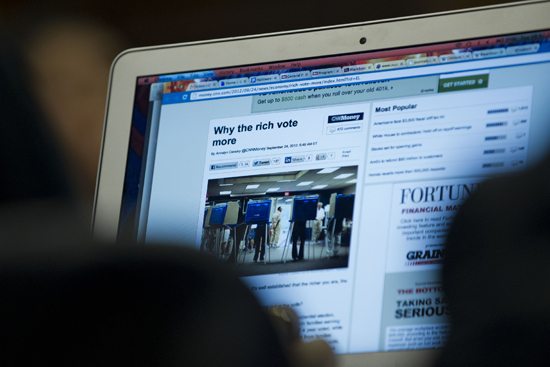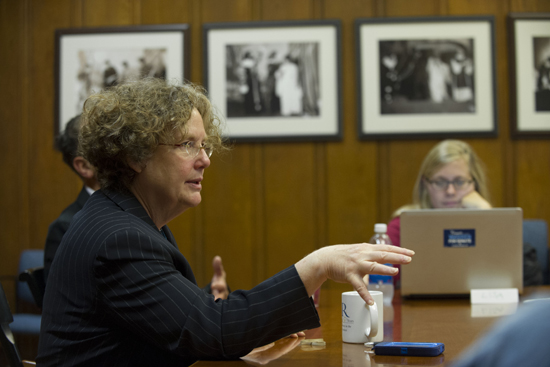The Campaign Gets Academic
Course offers hands-on look at how elections work

Election Campaign Practicum is geared toward students who are active, involved, and interested in politics and in campaigns. Photos by Kalman Zabarsky
Class by class, lecture by lecture, question asked by question answered, an education is built. This is one of a series of visits to one class, on one day, in search of those building blocks at BU.
Eric Wittenberg’s eyes have been opened to the world of high-stakes politics this semester. In a class discussion on campaign advertising, he learned some of the nuances employed to persuade voters to choose one candidate over the other.
“It matters whether you say Romney’s or Obama’s name first in an advertisement,” says Wittenberg (CAS’16). “It makes a difference how you pose a question about a candidate in a poll.”
The lessons come from Election Campaign Practicum, a political science course taught by Virginia Sapiro, dean of Arts & Sciences and a professor of political science. The class is designed for political junkies—students who read the Drudge Report and Politico, who peek at the latest polls in class, and who would work for a campaign this election season even if it weren’t a class requirement.
“We know there are a certain number of students who are very active, involved, and interested in politics and in campaigns,” Sapiro says. “This gives those kinds of students an opportunity to weave their experiences in with the classroom.” In addition to the usual requirements, like mandatory attendance and some heavy reading, Sapiro asks students to keep a blog about their experiences, stay informed about the latest political news, and spend at least five hours a week working on a political campaign.
Wittenberg joined Obama for America, and he credits the class with revealing that campaign work can be a lot harder than it looks. “The class has made me realize how much goes into a campaign and given me a greater understanding of politics,” he says.
At 8:30 on a Tuesday morning, 16 students sit around a large wooden table in a CAS classroom, laptops and readings splayed out in front of them. Sapiro sits at the head of the table with guest speaker Graham Wilson, a CAS political science professor and department chair.

The discussion is about money, lots of money, like the $170 million that Republican nominee Mitt Romney raised in September, and the $181 million that Obama pulled in during the same time frame, the kind of money that has made this the most expensive presidential election campaign in history.
In 2008, Wilson tells the class, Democratic presidential nominee Obama announced that he would not take federal funding to run his election, the first time in a presidential election that had happened. This freed him from federal regulations determining how he could spend the money, and to a large extent, where it could come from.
“Obama made a decision that he could raise a lot more money in his campaign than he would get from the political election fund,” Wilson says. “He went private. McCain took the federal money, and Barack Obama heavily outspent him.”
To prepare for today’s talk, the class read the legal arguments behind Citizens United v. Federal Election Commission, in which the Supreme Court ruled that the government may not ban political spending by corporations and unions in elections. The January 2010 decision reshaped the way elections are financed.
The class discusses whether donors to a campaign are rewarded with access and political favors.
“I think there is a connection between money and speech,” says Jina Kim (CAS’13). “Now, speech has become a quantifiable variable, and people see that the more money you give, the greater chance you have to speak. That’s what bothers me.”
Other classes this semester have focused on polling, meeting with representatives from Congress to Campus, campaign advertising, and news coverage. Once the election is over, students will be in charge: they will choose the topics of study, and Sapiro will create a syllabus based on their preferences.

This course is a departure for Sapiro, who typically spends 10 hours a day leading the University’s largest college. She last taught the course in 1984, when she was a political science professor at the University of Wisconsin-Madison, where she was on the faculty for 31 years.
“I loved teaching and research,” says Sapiro. “It was a big decision for me to become a dean and an administrator. I miss teaching, and this was a great opportunity to teach this kind of course, which I have loved teaching before, because it gets me involved with the students. It’s probably my favorite part of my week.”
Students say the same thing. Mara Mellstrom (CAS’14), vice president of BU College Republicans, says one of the course’s most important lessons is the issue of bipartisanship. As a conservative, she has butted heads with liberal professors and students and has often felt outnumbered.
“In this class, I’ve never felt persecuted,” says Mellstrom, who works for the Scott Brown campaign as BU’s campus liaison.
“We’re having a well-informed educational discussion, and Dean Sapiro has a beautiful way of getting down to the nitty-gritty. She really makes us think about things that we as students take for granted. It’s more than about saying you support one candidate; it’s looking at how American policy really works, and applying it to our lives.”
This Series
Also in
One Class, One Day
-
November 30, 2018
Breaking Bad Director Gives CAS Class the Inside Dope
-
October 31, 2018
Trump and the Press: We’ve Been Here Before
-
August 3, 2018
A Scholarly Take on Superheroes

Comments & Discussion
Boston University moderates comments to facilitate an informed, substantive, civil conversation. Abusive, profane, self-promotional, misleading, incoherent or off-topic comments will be rejected. Moderators are staffed during regular business hours (EST) and can only accept comments written in English. Statistics or facts must include a citation or a link to the citation.